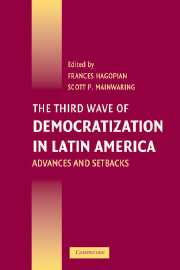Book contents
- Frontmatter
- Contents
- List of Figures
- List of Tables
- List of contributors
- Acknowledgments
- Introduction: The Third Wave of Democratization in Latin America
- 1 Latin American Democratization since 1978: Democratic Transitions, Breakdowns, and Erosions
- PART I THREE DEMOCRATIC GIANTS WITH AUTHORITARIAN PASTS: ARGENTINA, BRAZIL, AND MEXICO
- PART II UNEXPECTED DEMOCRACIES IN UNLIKELY COUNTRIES: BOLIVIA, EL SALVADOR, AND GUATEMALA
- 5 Bolivia's Democracy at the Crossroads
- 6 Challenges to Political Democracy in El Salvador
- 7 Democracy on Ice: The Multiple Challenges of Guatemala's Peace Process
- PART III DEMOCRATIC EROSIONS IN THE THIRD WAVE: COLOMBIA, PERU, AND VENEZUELA
- PART IV Conclusions
- References
- Index
6 - Challenges to Political Democracy in El Salvador
Published online by Cambridge University Press: 05 September 2012
- Frontmatter
- Contents
- List of Figures
- List of Tables
- List of contributors
- Acknowledgments
- Introduction: The Third Wave of Democratization in Latin America
- 1 Latin American Democratization since 1978: Democratic Transitions, Breakdowns, and Erosions
- PART I THREE DEMOCRATIC GIANTS WITH AUTHORITARIAN PASTS: ARGENTINA, BRAZIL, AND MEXICO
- PART II UNEXPECTED DEMOCRACIES IN UNLIKELY COUNTRIES: BOLIVIA, EL SALVADOR, AND GUATEMALA
- 5 Bolivia's Democracy at the Crossroads
- 6 Challenges to Political Democracy in El Salvador
- 7 Democracy on Ice: The Multiple Challenges of Guatemala's Peace Process
- PART III DEMOCRATIC EROSIONS IN THE THIRD WAVE: COLOMBIA, PERU, AND VENEZUELA
- PART IV Conclusions
- References
- Index
Summary
As El Salvador descended into civil war, few observers expected that political democracy would result. With a brief exception in the 1940s, El Salvador's regime had been authoritarian for decades prior to the civil war: Although elections were held, political competition was strictly limited, and the outcome was merely an endorsement of the continued rule of the official military party. The longstanding alliance between agrarian elites and the military meant that even modest attempts at reform were repeatedly vetoed, as hardline elements of the military carried out coups against reformist military elements and violently suppressed nascent social movements demanding change. Rather than bringing political development in its wake, economic diversification after World War II was accompanied by renewed political exclusion and economic concentration. The regime met the widespread social mobilization of the mid-1970s with brutality and violence rather than compromise. That the only contender for power in the aftermath of the repression was a revolutionary guerrilla movement also did not augur well for a democratic outcome.
Nonetheless, a negotiated peace settlement not only ended the civil war in 1992 but brought democratizing reforms to the regime and state, culminating in the country's first inclusive elections in 1994. Since then, political competition has increased as the erstwhile guerrilla movement gradually solidified its new identity as a political party: It became the leading party in the national legislature in the 2000 elections and maintained that position in the 2003 elections.
- Type
- Chapter
- Information
- The Third Wave of Democratization in Latin AmericaAdvances and Setbacks, pp. 179 - 201Publisher: Cambridge University PressPrint publication year: 2005
- 7
- Cited by



